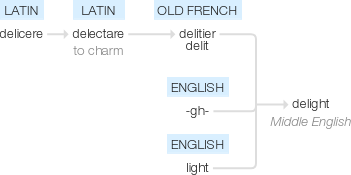Delight
Middle English: from Old French delitier (verb), delit (noun), from Latin delectare ‘to charm’, frequentative of delicere . The -gh- was added in the 16th century by association with light1.
wiktionary
From Middle English delite, from Old French deleiter, deliter, from Latin delectare(“to delight, please”), frequentative of delicere(“to allure”). Related with delectation and delicate. The modern unetymological spelling (instead of expected delite) is influenced by light and other words in -ight, such as might, bright, etc. The -gh- may also be an attempt to represent the Latin -c-; compare obsolete indight for indict.
etymonline
delight (n.)
c. 1200, delit, "high degree of pleasure or satisfaction," also "that which gives great pleasure," from Old French delit "pleasure, delight, sexual desire," from delitier "please greatly, charm," from Latin delectare "to allure, delight, charm, please," frequentative of delicere "entice" (see delicious). Spelled delite until 16c.; the modern unetymological form is by influence of light, flight, etc.
delight (v.)
c. 1200, deliten, intransitive, "to have or take great pleasure;" c. 1300, transitive, "to affect with great pleasure," from Old French delitier "please greatly, charm," from Latin delectare "to allure, delight, charm, please," frequentative of delicere "entice" (see delicious). Related: Delighted; delighting.
